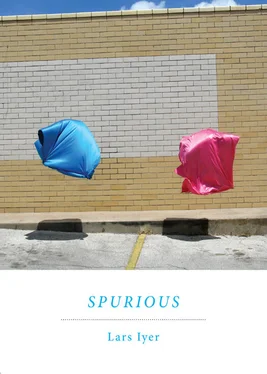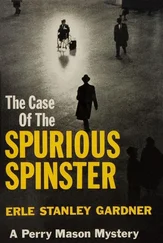There’s crumbled brick and wood on the work surfaces, I tell W.: the ceiling continues to cave in; the hole is still wide open. What’s up there? Something terrible. Something dark. There’s an open slice between the flats. I hear the voices of the tenants upstairs echoing there, ghostly, so I can’t make out what is said. Yes, there’s something terrible there, the source of all damp, there between the flats.
‘So how fat are you now?’, says W., ‘you must be really fat. Are you eating at the moment? What are you eating?’
W. has always been intrigued by my eating habits. He likes to put his hand on my belly. — ‘It’s big’, he marvels. ‘But this is just the start. You’re going to be enormous’.
W. remembers the elasticated trousers of the American professors he’s met. There was a whole herd of them, he says, like walruses on a beach, all with elasticated trousers. That’s what you’ll be wearing soon, says W., great billowing trousers with trouser legs like circus tents.
Food is a sacrament, W. has always believed, which is another reason he thinks I am so disgusting. I have no sense of food, he says, I could be eating anything. For a long time, he remembers, I lived only on discounted sandwiches from Boots, 75p a packet.
He remembers me telling him of my circumambulations of town in search of discounted sandwiches. My great circumambulations, W. says, taking in every possible shop that sold stale, discounted sandwiches.
For a long time, W. remembers, I ate only gingerbread men, five a day. I would buy a packet of five stale gingerbread men from the discount bakery and a fourpack of own-branded supermarket lager from Kwik Save, the very worst.
‘No wonder you were always ill’, W. says. ‘No wonder you were always complaining about your stomach’. Of course, I was poor then, W. concedes, but that was no excuse.
Gluttony has always appalled W., who has a small and delicate appetite. He always undertakes special measures when I come to visit him, to make sure there’s enough food in the house. It was part of the reason he bought his new fridge, W, says. — ‘You’re greedy, greedy!’
When I text from the airport to tell him I’ve arrived, he opens a bottle of Chablis or Cava and puts the glasses on the table, and then unwraps a block of Emmenthal and brings out his sliced meats, along with olive oil and relishes. He’ll offer bread, which he will have made himself, and slices of smoked salmon.
‘Only the best!’, says W. ‘Only the best for my friends!’ Food’s a gift, W. says, the greatest of gifts, which I desecrate every time I visit him.
A little later. — ‘Food is for the other’, W. announces. ‘It’s a gift’. He lays out slices of Emmenthal and cold meat. — ‘You’re the other’, he says, ‘so I have to feed you’. From your own mouth? — ‘That’s what Levinas says’. W. opens his mouth. — ‘Do you want some? Do you?’
Sometimes, I remind him, W. likes to explain things about me to other people like an indulgent mother. — ‘The thing about Lars is …’, he’ll begin. Or: ‘What you have to understand about Lars is …’ And best of all, when he’s feeling very tender, ‘What I love about Lars is …’ Is that it, then? I ask W., do you love me? — ‘Yes, I love you’, says W. ‘You see, I can talk about love. I can express my feelings. Not like you’.
I keep a mental list of W.’s favourite questions, which he constantly asks me so as to ask himself. — ‘At what point did you realise that you would amount to nothing?’; ‘When was it that you first became aware you would be nothing but a failure?’; ‘When you look back at your life, what do you see?’; ‘How is it that you know what greatness is, and that you will never, ever reach it?’
‘What does it mean to you that your life has amounted to nothing? W. asks me with great seriousness. And then, ‘Why have your friends never made you greater?’ This is W.’s great fantasy, he admits: a group of friends who could make one another think. Do I make him think? I ask him. — ‘No! The opposite! You’re an idiot!’
Then: ‘What do you consider to be your greatest weakness?’ W. answers for me: ‘Never having come to terms with your lack of ability. Because you haven’t, have you? Have you?’
I ask him what is most distorted about his understanding of the world. — ‘I have this fantasy of being part of a community, and this prevents my individual action’. And then, dolefully, ‘I don’t work hard enough’. But he works night and day, I tell him. — ‘Oh compared to you, I work. Compared to you, we’re all busy’.
‘What time did you get up to work this morning?’, says W. Five. — ‘I was up at four. At four!’ , W. says. But he laments the fact that he watches television in the evenings. He used to work in the evenings, he says. In fact, he worked all the time. A room with a bed and a desk and his books, that’s all. — ‘That was my peak’, he says. ‘When are you going to peak? Are you peaking now? Is this it?’
W. admires my adamantine apocalypticism , he says. It’s very cold and pure, he says, like the sky on a winter morning. — ‘Your sense of the apocalypse is absolute’, he says, ‘you’re sure of it’. He’s not sure of it, he says. He still believes something could save us, though he also knows nothing will save us. He knows nothing will save us, but he feels something will save us, that’s the thing.
That’s his messianism, W. says. But there’s no messianism in me whatsoever, W. acknowledges. I’m far beyond that. Some process has completed itself in me, he says. Something, a whole history has been brought to an end.
How long has he been reading Rosenzweig? W wonders. It’s like rain hitting a tin roof, he says. Nothing goes in. It makes no impression. But at least he does read; at least there is the steady rhythm of his non-understanding as it beats against his intelligence. He knows his limits, W. says, because they are constantly tested. He has a sense of what he does not know.
What’s he working on, and why is he bothering? W. asks himself. What does it matter? Why does he read these books that are too hard for him? Why does he batter himself against the wall of mathematics? What difference does it make? What’s it all for? Who could he possibly influence or persuade?
And finally, who will listen to him but me, who has no idea what he is talking about, and can only regard the work of Rosenzweig and Cohen with the awe of an ape before the thundering power of a waterfall? — ‘What can it possibly mean to you?’, says W. That’s what makes it even worse: the only person paying attention to him, says W., is the one least capable of understanding anything he says.
But then too, W. says, he doesn’t really understand Rosenzweig and Cohen either, and he too can only hoot and point like an ape at their mighty oeuvres.
Yesterday, I tell W., the workmen came and took the ceiling down and fitted new joists next to the old, rotten ones. Then they hammered boards over the joists. But it makes no difference: the walls are still wet.
‘It’s what will happen if you lay plaster on wet brick’, the Loss Adjuster told me, looking at the discoloured walls of the kitchen, deep brown and rich green. — ‘It’s very porous’, she said of the new plaster. ‘That’s why the damp spread so quickly’.
‘Your bathroom’s okay’, she said, ‘but we’ll have to dry out your wall. Everything’ll have to come out. We might have to replace the cupboards, too. And you’ll have to empty them. And we’ll need the washing machine out’. Looking up at the ceiling she said, ‘I’m surprised the washing machine from upstairs hasn’t come right through. The joists are completely rotten’.
Читать дальше












